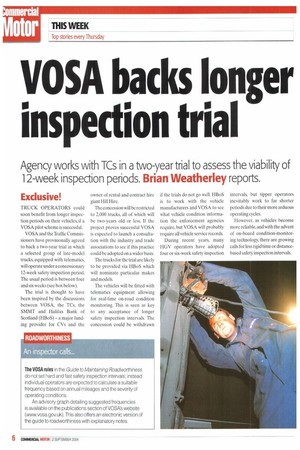VOSA backs longer inspedion trial
Page 6

If you've noticed an error in this article please click here to report it so we can fix it.
Agency works with TCs in a two-year trial to assess the viability of 12-week inspection periods. Brian Weatherley reports.
Exclusive!
TRUCK OPERATORS could soon benefit from longer inspection periods on their vehicles, if a VOSA pilot scheme is successful.
VOSA and the Traffic Commissioners have provisionally agreed to back a two-year trial in which a selected group of late-model trucks, equipped with telematics. will operate under a concessionary 12-week safety inspection period. The usual period is between four and six weeks (see box below).
The trial is thought to have been inspired by the discussions between VOSA, the TCs, the SMMT and Halifax Bank of Scotland (HBoS) — a major funding provider for CVs and the owner of rental and contract hire giant Hill Hire.
The concession will be restricted to 2,000 trucks, all of which will be two-years old or less. If the project proves successful VOSA is expected to launch a consultation with the industry and trade associations to see if this practice could be adopted on a wider basis.
The trucks for the trial are likely to be provided via HBoS which will nominate particular makes and models.
The vehicles will be fitted with telematics equipment allowing for real-time on-road condition monitoring. This is seen as key to any acceptance of longer safety inspection intervals. The concession could be withdrawn if the trials do not go well. HBoS is to work with the vehicle manufacturers and VOSA to see what vehicle condition information the enforcement agencies require, but VOSA will probably require all vehicle service records.
During recent years, many HGV operators have adopted four or six-week safety inspection intervals, but tipper operators inevitably work to far shorter periods due to their more arduous operating cycles.
However, as vehicles become more reliable, and with the advent of on-board condition-monitoring technology, there are growing calls for less rigid time or distancebased safety inspection intervals.




























































































































































































